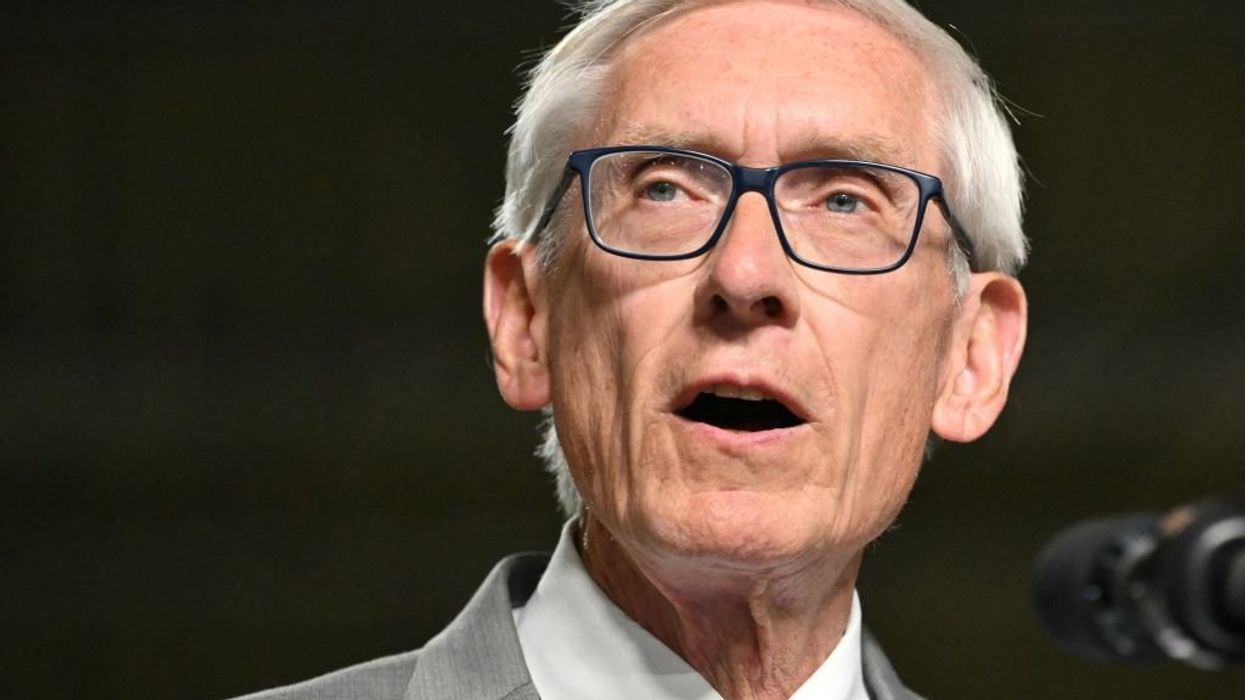
Photo by MANDEL NGAN/AFP via Getty Images

Democratic Gov. Tony Evers did not handle the news well, calling the decision 'unconscionable.'
The Wisconsin Supreme Court ruled unanimously Wednesday that Democratic Gov. Tony Evers "breached his constitutional boundaries" when he partially vetoed and modified substantive portions of a bill in a literacy package last year.
Evers clearly did not appreciate being put in his place.
In the wake of the ruling, Evers claimed that the majority-liberal court's decision was "unconscionable."
Republicans, meanwhile, celebrated the ruling, in one instance throwing leftists' NoKings hashtag back at them.
State Sen. Julian Bradley (R) noted that the governor's "ridiculous and unlawful veto that held up money to teach kids to read has been UNANIMOUSLY ruled unconstitutional," adding that "even the far left-wing justices couldn't find a way to justify @GovEvers' actions. #NoKings."
Wisconsin's Republican-led legislature sued Evers in April 2024 over his partial veto of a bill intended to help fund literacy programs in the Badger State.

Senate Bill 971 empowered the GOP-controlled state Joint Committee on Finance to direct $50 million set aside in the biennial budget to specific Department of Public Instruction programs created after the budget bill passed, including the literacy coaching program, the DPI's Office of Literacy, and grants for early literacy curriculum.
While Evers approved SB 971, he improperly exercised partial-veto power to strike certain sections of the legislation in part and others in full that he claimed overly complicated "the allocation of funding related to literacy programs in Wisconsin by creating multiple appropriations for what could be accomplished with one."
'Wisconsin families are the real winners here.'
The Democratic governor suggested further that his actions would ensure greater flexibility in meeting the "investment needs for coaches, grants, and professional development alike."
While Evers may partially veto an appropriation bill under Article V, Section 10(1)(b) of the Wisconsin Constitution, this was not an appropriations bill.
The Republican legislators' complaint noted that if the governor mistakenly believed SB 971 was an appropriations bill, "he should have requested the legislature recall the bill in order to pass both houses of the legislature with the proper vote." After all, any bill that appropriates funds must pass both chambers with a roll-call vote — something that had not taken place in this case.
The complaint noted further that the unconstitutional partial veto of SB 971 left the legislature in a dilemma: While the JCF wanted to fund the appropriate literacy programs, "any money directed under the partially vetoed version of [SB 971] might (but should not) be treated by DPI as money that can be used by the Office of Literacy for any nondescript 'literacy program' of DPI's invention."
The Wisconsin Supreme Court sided with the Republican legislature against Evers Wednesday and torpedoed his narrative concerning the JCF, which he suggested had been wrong to withhold funds.
The court noted that the Wisconsin Constitution "does not authorize the governor to partially veto a non-appropriation bill, which the governor may veto only in its entirety."
"We hold the governor breached his constitutional boundaries because the bill he partially vetoed was not an appropriation bill," said the ruling. "We also hold JCF did not improperly withhold funds the legislature appropriated to JCF."

As a result of the court's decision, SB 971 as passed by the state legislature — without Evers' changes — is the law.
The Associated Press suggested that the Wisconsin Supreme Court's ruling might also result in the legislature pushing budget and other spending bills in a similar manner to get around Evers' future partial vetoes, thereby securing greater control over spending.
State Senate Majority Leader Devin LeMahieu (R) and Assembly Speaker Robin Vos (R) said in a joint statement that the ruling "is a rebuke of the Governor’s attempt to break apart a bipartisan literacy-funding bill and JCF's constitutional authority to give supplemental funding to agencies."
"While the governor wanted to play politics with money earmarked for kids' reading programs, it is encouraging to see the court put an end to this game. Wisconsin families are the real winners here," they added.
Evers did his best to spin his efforts and pin the holdup of funds on Republicans, writing, "I will never apologize for fighting for our kids and our schools. Not today, not ever."
"Twelve lawmakers should not be able to obstruct resources that were already approved by the full legislature and the governor to help get our kids up to speed and ensure they have the skills they need to be successful," continued Evers. "It is unconscionable that the Wisconsin Supreme Court is allowing the legislature's indefinite obstruction to go unchecked."
The Democratic governor urged the JCF to immediately release the $50 million before the money goes back into the state's general fund next week.
Like Blaze News? Bypass the censors, sign up for our newsletters, and get stories like this direct to your inbox. Sign up here!